Interpersonal Communication Skills: Social Work and Welfare Services
VerifiedAdded on 2020/04/01
|8
|1782
|39
Essay
AI Summary
This essay delves into the critical role of communication skills in the field of social work, emphasizing the importance of listening, feedback, and questioning. It highlights how these interpersonal skills are essential for effective practice within social and welfare services, which heavily rely on human interaction. The essay discusses the practical application of these skills, aligning with sociological and communication theories, and emphasizing their benefits in building trust, resolving conflicts, and designing interventions. Active listening, the art of asking open-ended questions, and the provision of constructive feedback are all explored as vital components in fostering positive client relationships and achieving successful outcomes. The essay concludes by stressing the necessity of these communication skills for social workers to ensure client satisfaction and improve overall work performance, while avoiding potential misinterpretations of service delivery.
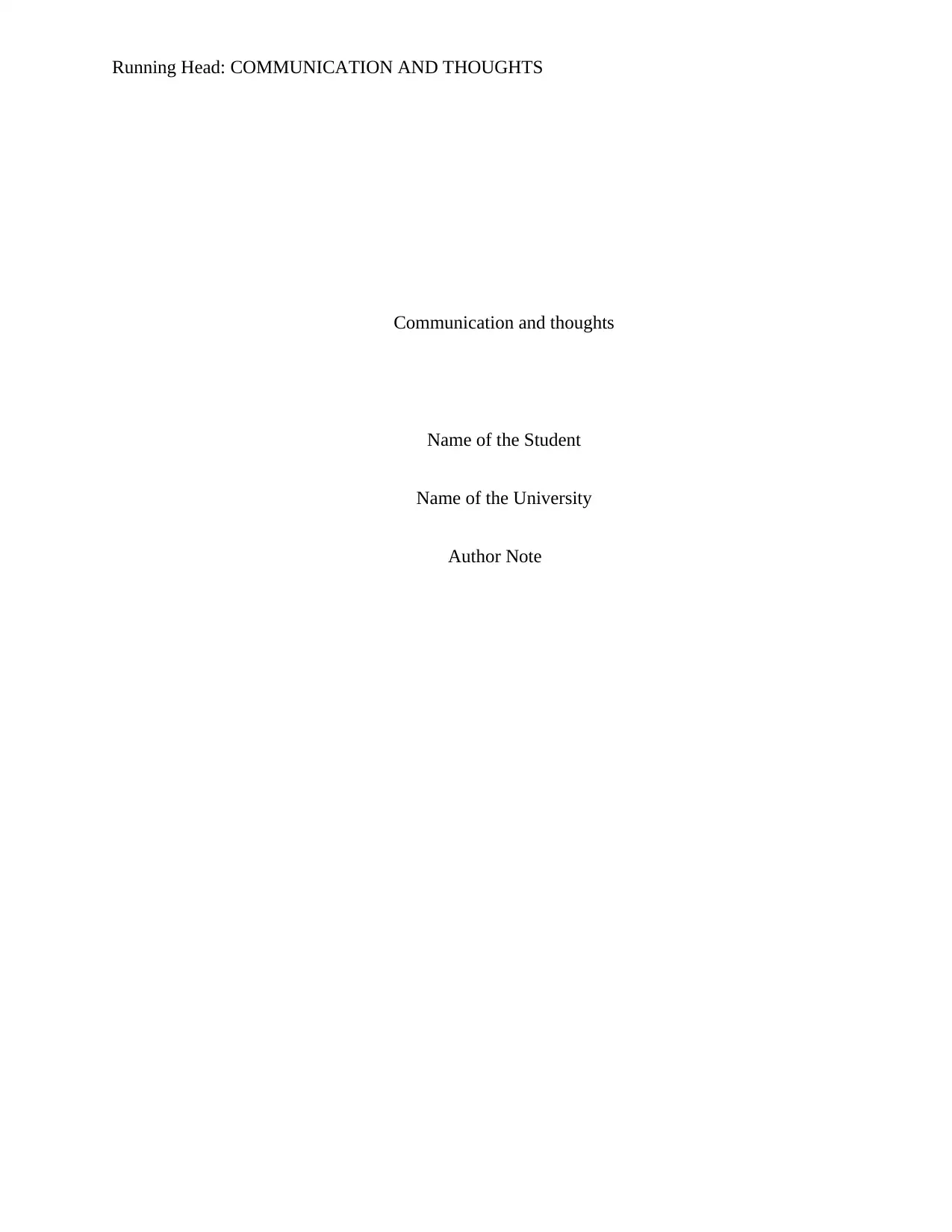
Running Head: COMMUNICATION AND THOUGHTS
Communication and thoughts
Name of the Student
Name of the University
Author Note
Communication and thoughts
Name of the Student
Name of the University
Author Note
Paraphrase This Document
Need a fresh take? Get an instant paraphrase of this document with our AI Paraphraser
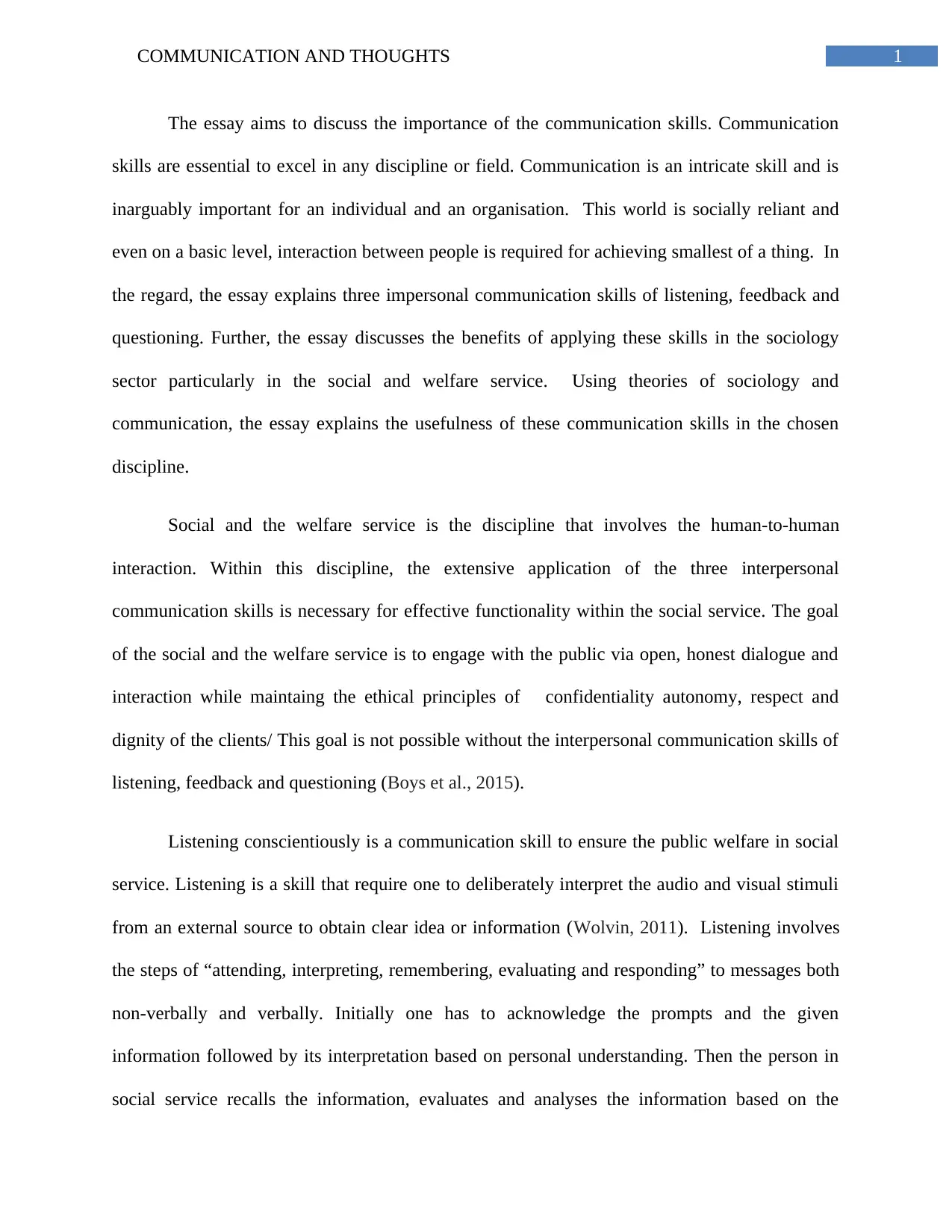
1COMMUNICATION AND THOUGHTS
The essay aims to discuss the importance of the communication skills. Communication
skills are essential to excel in any discipline or field. Communication is an intricate skill and is
inarguably important for an individual and an organisation. This world is socially reliant and
even on a basic level, interaction between people is required for achieving smallest of a thing. In
the regard, the essay explains three impersonal communication skills of listening, feedback and
questioning. Further, the essay discusses the benefits of applying these skills in the sociology
sector particularly in the social and welfare service. Using theories of sociology and
communication, the essay explains the usefulness of these communication skills in the chosen
discipline.
Social and the welfare service is the discipline that involves the human-to-human
interaction. Within this discipline, the extensive application of the three interpersonal
communication skills is necessary for effective functionality within the social service. The goal
of the social and the welfare service is to engage with the public via open, honest dialogue and
interaction while maintaing the ethical principles of confidentiality autonomy, respect and
dignity of the clients/ This goal is not possible without the interpersonal communication skills of
listening, feedback and questioning (Boys et al., 2015).
Listening conscientiously is a communication skill to ensure the public welfare in social
service. Listening is a skill that require one to deliberately interpret the audio and visual stimuli
from an external source to obtain clear idea or information (Wolvin, 2011). Listening involves
the steps of “attending, interpreting, remembering, evaluating and responding” to messages both
non-verbally and verbally. Initially one has to acknowledge the prompts and the given
information followed by its interpretation based on personal understanding. Then the person in
social service recalls the information, evaluates and analyses the information based on the
The essay aims to discuss the importance of the communication skills. Communication
skills are essential to excel in any discipline or field. Communication is an intricate skill and is
inarguably important for an individual and an organisation. This world is socially reliant and
even on a basic level, interaction between people is required for achieving smallest of a thing. In
the regard, the essay explains three impersonal communication skills of listening, feedback and
questioning. Further, the essay discusses the benefits of applying these skills in the sociology
sector particularly in the social and welfare service. Using theories of sociology and
communication, the essay explains the usefulness of these communication skills in the chosen
discipline.
Social and the welfare service is the discipline that involves the human-to-human
interaction. Within this discipline, the extensive application of the three interpersonal
communication skills is necessary for effective functionality within the social service. The goal
of the social and the welfare service is to engage with the public via open, honest dialogue and
interaction while maintaing the ethical principles of confidentiality autonomy, respect and
dignity of the clients/ This goal is not possible without the interpersonal communication skills of
listening, feedback and questioning (Boys et al., 2015).
Listening conscientiously is a communication skill to ensure the public welfare in social
service. Listening is a skill that require one to deliberately interpret the audio and visual stimuli
from an external source to obtain clear idea or information (Wolvin, 2011). Listening involves
the steps of “attending, interpreting, remembering, evaluating and responding” to messages both
non-verbally and verbally. Initially one has to acknowledge the prompts and the given
information followed by its interpretation based on personal understanding. Then the person in
social service recalls the information, evaluates and analyses the information based on the
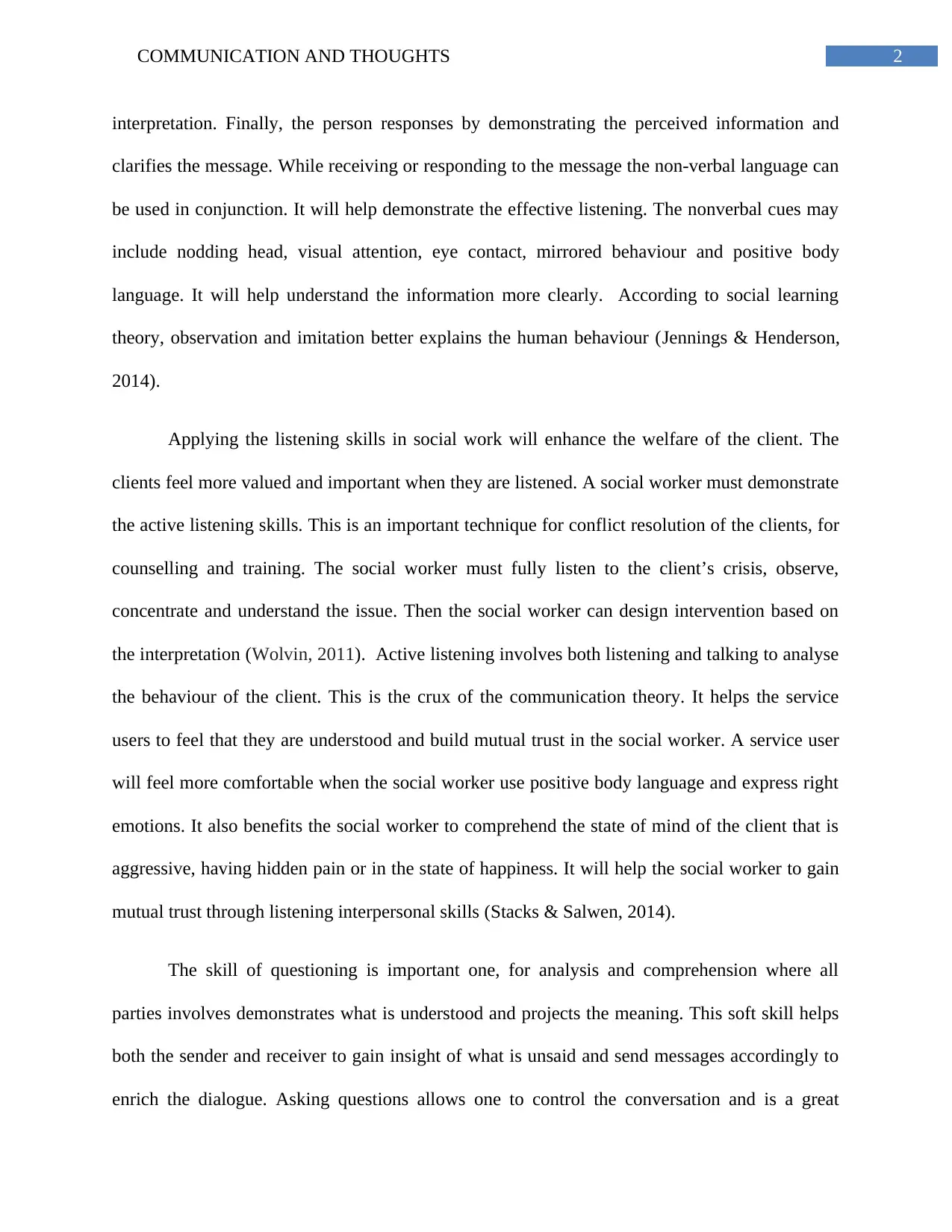
2COMMUNICATION AND THOUGHTS
interpretation. Finally, the person responses by demonstrating the perceived information and
clarifies the message. While receiving or responding to the message the non-verbal language can
be used in conjunction. It will help demonstrate the effective listening. The nonverbal cues may
include nodding head, visual attention, eye contact, mirrored behaviour and positive body
language. It will help understand the information more clearly. According to social learning
theory, observation and imitation better explains the human behaviour (Jennings & Henderson,
2014).
Applying the listening skills in social work will enhance the welfare of the client. The
clients feel more valued and important when they are listened. A social worker must demonstrate
the active listening skills. This is an important technique for conflict resolution of the clients, for
counselling and training. The social worker must fully listen to the client’s crisis, observe,
concentrate and understand the issue. Then the social worker can design intervention based on
the interpretation (Wolvin, 2011). Active listening involves both listening and talking to analyse
the behaviour of the client. This is the crux of the communication theory. It helps the service
users to feel that they are understood and build mutual trust in the social worker. A service user
will feel more comfortable when the social worker use positive body language and express right
emotions. It also benefits the social worker to comprehend the state of mind of the client that is
aggressive, having hidden pain or in the state of happiness. It will help the social worker to gain
mutual trust through listening interpersonal skills (Stacks & Salwen, 2014).
The skill of questioning is important one, for analysis and comprehension where all
parties involves demonstrates what is understood and projects the meaning. This soft skill helps
both the sender and receiver to gain insight of what is unsaid and send messages accordingly to
enrich the dialogue. Asking questions allows one to control the conversation and is a great
interpretation. Finally, the person responses by demonstrating the perceived information and
clarifies the message. While receiving or responding to the message the non-verbal language can
be used in conjunction. It will help demonstrate the effective listening. The nonverbal cues may
include nodding head, visual attention, eye contact, mirrored behaviour and positive body
language. It will help understand the information more clearly. According to social learning
theory, observation and imitation better explains the human behaviour (Jennings & Henderson,
2014).
Applying the listening skills in social work will enhance the welfare of the client. The
clients feel more valued and important when they are listened. A social worker must demonstrate
the active listening skills. This is an important technique for conflict resolution of the clients, for
counselling and training. The social worker must fully listen to the client’s crisis, observe,
concentrate and understand the issue. Then the social worker can design intervention based on
the interpretation (Wolvin, 2011). Active listening involves both listening and talking to analyse
the behaviour of the client. This is the crux of the communication theory. It helps the service
users to feel that they are understood and build mutual trust in the social worker. A service user
will feel more comfortable when the social worker use positive body language and express right
emotions. It also benefits the social worker to comprehend the state of mind of the client that is
aggressive, having hidden pain or in the state of happiness. It will help the social worker to gain
mutual trust through listening interpersonal skills (Stacks & Salwen, 2014).
The skill of questioning is important one, for analysis and comprehension where all
parties involves demonstrates what is understood and projects the meaning. This soft skill helps
both the sender and receiver to gain insight of what is unsaid and send messages accordingly to
enrich the dialogue. Asking questions allows one to control the conversation and is a great
⊘ This is a preview!⊘
Do you want full access?
Subscribe today to unlock all pages.

Trusted by 1+ million students worldwide
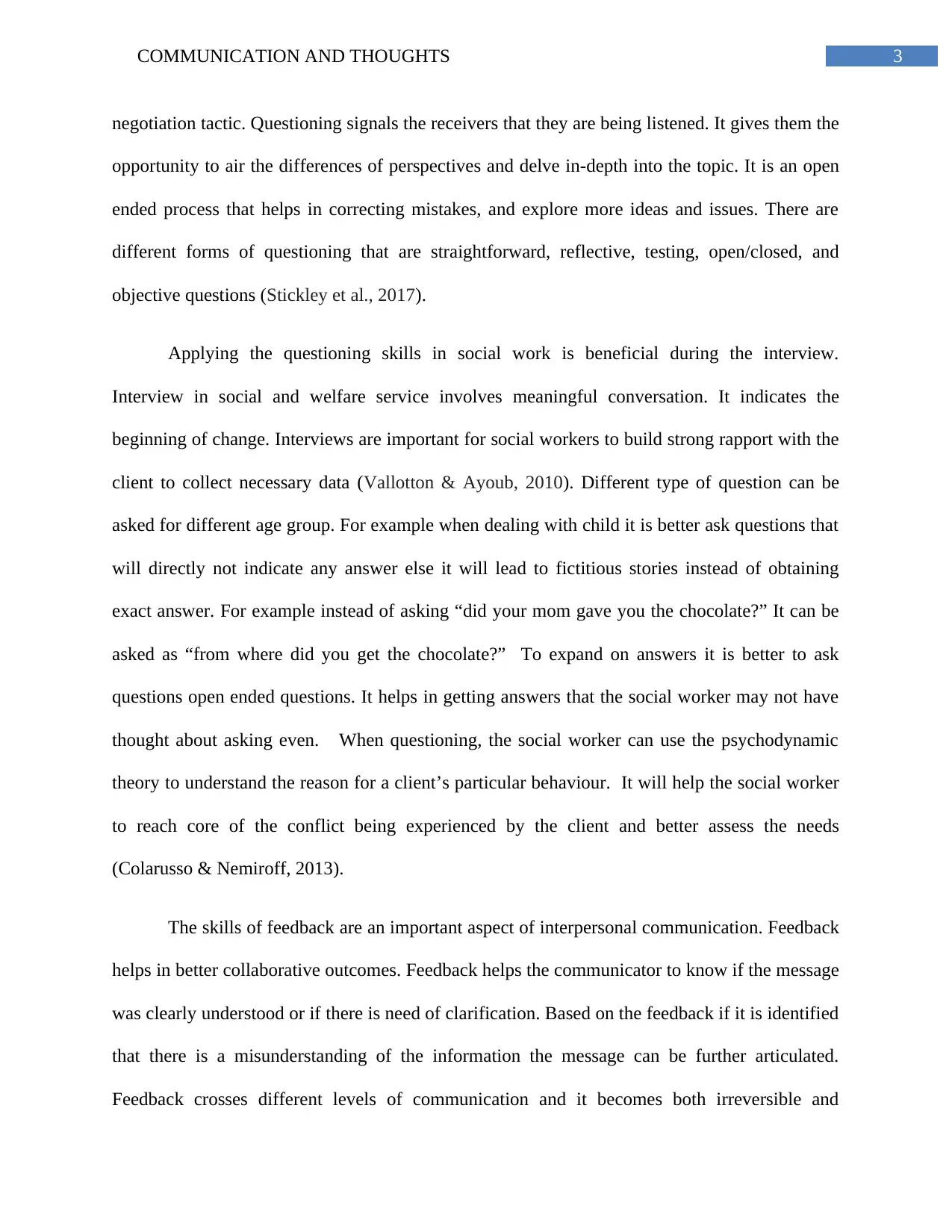
3COMMUNICATION AND THOUGHTS
negotiation tactic. Questioning signals the receivers that they are being listened. It gives them the
opportunity to air the differences of perspectives and delve in-depth into the topic. It is an open
ended process that helps in correcting mistakes, and explore more ideas and issues. There are
different forms of questioning that are straightforward, reflective, testing, open/closed, and
objective questions (Stickley et al., 2017).
Applying the questioning skills in social work is beneficial during the interview.
Interview in social and welfare service involves meaningful conversation. It indicates the
beginning of change. Interviews are important for social workers to build strong rapport with the
client to collect necessary data (Vallotton & Ayoub, 2010). Different type of question can be
asked for different age group. For example when dealing with child it is better ask questions that
will directly not indicate any answer else it will lead to fictitious stories instead of obtaining
exact answer. For example instead of asking “did your mom gave you the chocolate?” It can be
asked as “from where did you get the chocolate?” To expand on answers it is better to ask
questions open ended questions. It helps in getting answers that the social worker may not have
thought about asking even. When questioning, the social worker can use the psychodynamic
theory to understand the reason for a client’s particular behaviour. It will help the social worker
to reach core of the conflict being experienced by the client and better assess the needs
(Colarusso & Nemiroff, 2013).
The skills of feedback are an important aspect of interpersonal communication. Feedback
helps in better collaborative outcomes. Feedback helps the communicator to know if the message
was clearly understood or if there is need of clarification. Based on the feedback if it is identified
that there is a misunderstanding of the information the message can be further articulated.
Feedback crosses different levels of communication and it becomes both irreversible and
negotiation tactic. Questioning signals the receivers that they are being listened. It gives them the
opportunity to air the differences of perspectives and delve in-depth into the topic. It is an open
ended process that helps in correcting mistakes, and explore more ideas and issues. There are
different forms of questioning that are straightforward, reflective, testing, open/closed, and
objective questions (Stickley et al., 2017).
Applying the questioning skills in social work is beneficial during the interview.
Interview in social and welfare service involves meaningful conversation. It indicates the
beginning of change. Interviews are important for social workers to build strong rapport with the
client to collect necessary data (Vallotton & Ayoub, 2010). Different type of question can be
asked for different age group. For example when dealing with child it is better ask questions that
will directly not indicate any answer else it will lead to fictitious stories instead of obtaining
exact answer. For example instead of asking “did your mom gave you the chocolate?” It can be
asked as “from where did you get the chocolate?” To expand on answers it is better to ask
questions open ended questions. It helps in getting answers that the social worker may not have
thought about asking even. When questioning, the social worker can use the psychodynamic
theory to understand the reason for a client’s particular behaviour. It will help the social worker
to reach core of the conflict being experienced by the client and better assess the needs
(Colarusso & Nemiroff, 2013).
The skills of feedback are an important aspect of interpersonal communication. Feedback
helps in better collaborative outcomes. Feedback helps the communicator to know if the message
was clearly understood or if there is need of clarification. Based on the feedback if it is identified
that there is a misunderstanding of the information the message can be further articulated.
Feedback crosses different levels of communication and it becomes both irreversible and
Paraphrase This Document
Need a fresh take? Get an instant paraphrase of this document with our AI Paraphraser
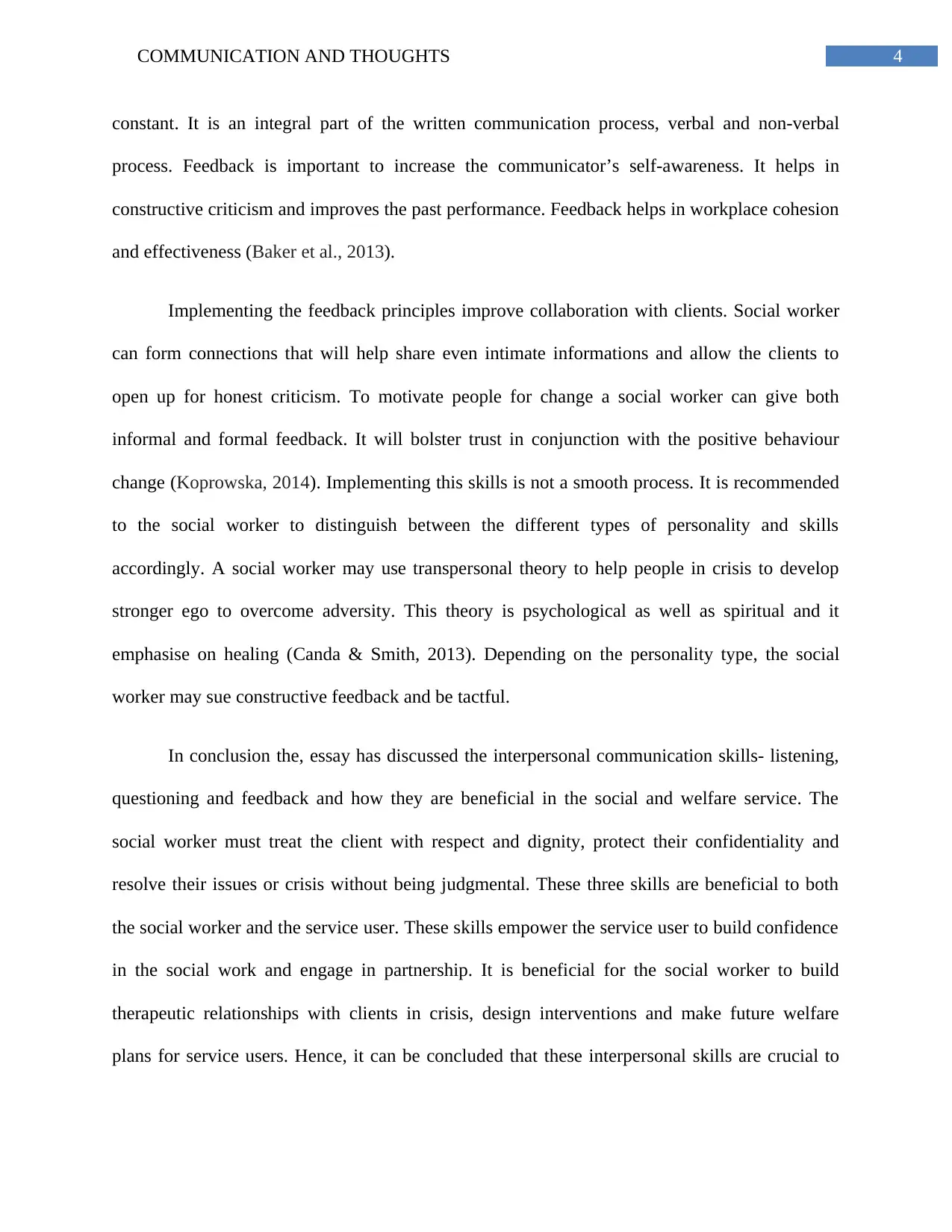
4COMMUNICATION AND THOUGHTS
constant. It is an integral part of the written communication process, verbal and non-verbal
process. Feedback is important to increase the communicator’s self-awareness. It helps in
constructive criticism and improves the past performance. Feedback helps in workplace cohesion
and effectiveness (Baker et al., 2013).
Implementing the feedback principles improve collaboration with clients. Social worker
can form connections that will help share even intimate informations and allow the clients to
open up for honest criticism. To motivate people for change a social worker can give both
informal and formal feedback. It will bolster trust in conjunction with the positive behaviour
change (Koprowska, 2014). Implementing this skills is not a smooth process. It is recommended
to the social worker to distinguish between the different types of personality and skills
accordingly. A social worker may use transpersonal theory to help people in crisis to develop
stronger ego to overcome adversity. This theory is psychological as well as spiritual and it
emphasise on healing (Canda & Smith, 2013). Depending on the personality type, the social
worker may sue constructive feedback and be tactful.
In conclusion the, essay has discussed the interpersonal communication skills- listening,
questioning and feedback and how they are beneficial in the social and welfare service. The
social worker must treat the client with respect and dignity, protect their confidentiality and
resolve their issues or crisis without being judgmental. These three skills are beneficial to both
the social worker and the service user. These skills empower the service user to build confidence
in the social work and engage in partnership. It is beneficial for the social worker to build
therapeutic relationships with clients in crisis, design interventions and make future welfare
plans for service users. Hence, it can be concluded that these interpersonal skills are crucial to
constant. It is an integral part of the written communication process, verbal and non-verbal
process. Feedback is important to increase the communicator’s self-awareness. It helps in
constructive criticism and improves the past performance. Feedback helps in workplace cohesion
and effectiveness (Baker et al., 2013).
Implementing the feedback principles improve collaboration with clients. Social worker
can form connections that will help share even intimate informations and allow the clients to
open up for honest criticism. To motivate people for change a social worker can give both
informal and formal feedback. It will bolster trust in conjunction with the positive behaviour
change (Koprowska, 2014). Implementing this skills is not a smooth process. It is recommended
to the social worker to distinguish between the different types of personality and skills
accordingly. A social worker may use transpersonal theory to help people in crisis to develop
stronger ego to overcome adversity. This theory is psychological as well as spiritual and it
emphasise on healing (Canda & Smith, 2013). Depending on the personality type, the social
worker may sue constructive feedback and be tactful.
In conclusion the, essay has discussed the interpersonal communication skills- listening,
questioning and feedback and how they are beneficial in the social and welfare service. The
social worker must treat the client with respect and dignity, protect their confidentiality and
resolve their issues or crisis without being judgmental. These three skills are beneficial to both
the social worker and the service user. These skills empower the service user to build confidence
in the social work and engage in partnership. It is beneficial for the social worker to build
therapeutic relationships with clients in crisis, design interventions and make future welfare
plans for service users. Hence, it can be concluded that these interpersonal skills are crucial to

5COMMUNICATION AND THOUGHTS
satisfy customers to improve the work performance. If these skills are not implemented
effectively, it may lead to misinterpretations about the service.
satisfy customers to improve the work performance. If these skills are not implemented
effectively, it may lead to misinterpretations about the service.
⊘ This is a preview!⊘
Do you want full access?
Subscribe today to unlock all pages.

Trusted by 1+ million students worldwide
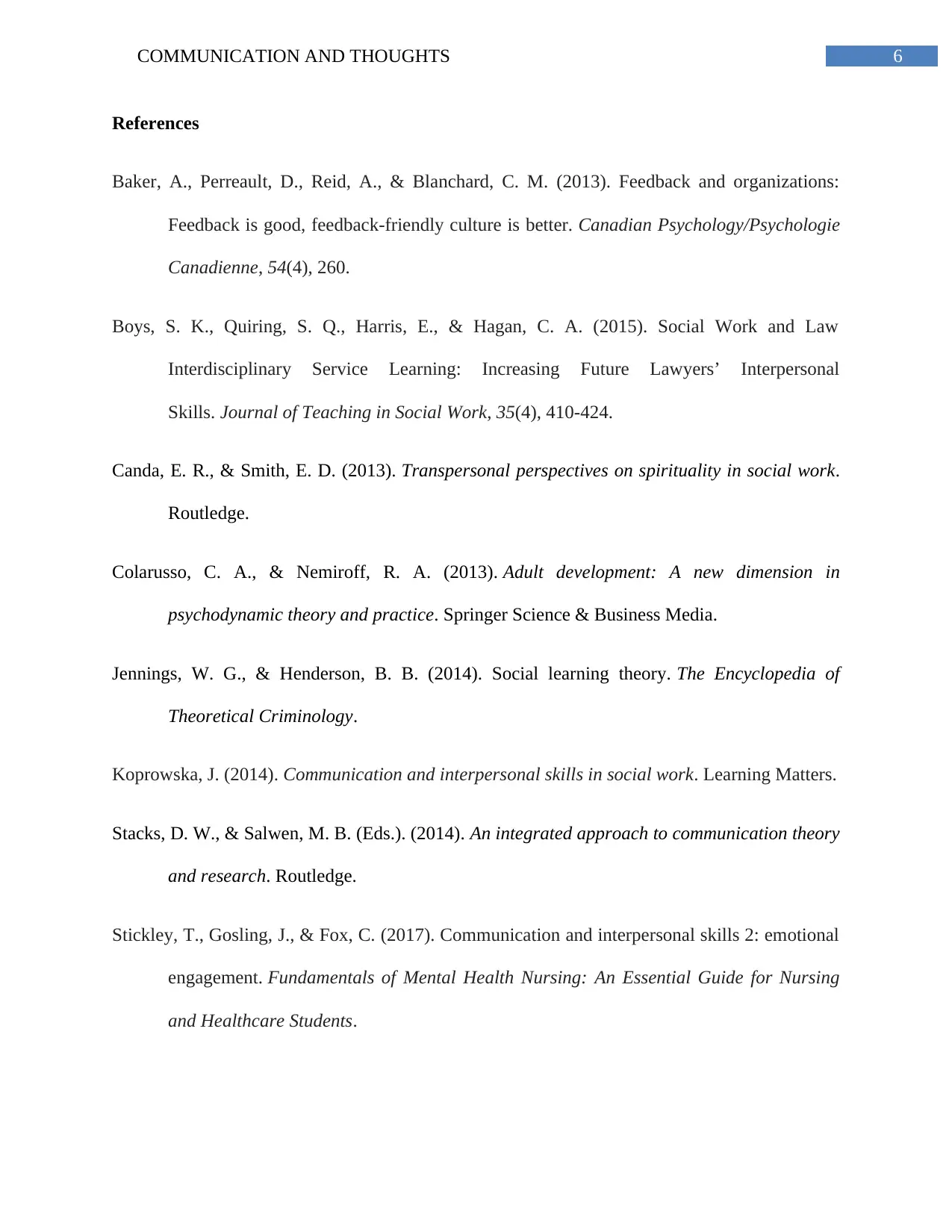
6COMMUNICATION AND THOUGHTS
References
Baker, A., Perreault, D., Reid, A., & Blanchard, C. M. (2013). Feedback and organizations:
Feedback is good, feedback-friendly culture is better. Canadian Psychology/Psychologie
Canadienne, 54(4), 260.
Boys, S. K., Quiring, S. Q., Harris, E., & Hagan, C. A. (2015). Social Work and Law
Interdisciplinary Service Learning: Increasing Future Lawyers’ Interpersonal
Skills. Journal of Teaching in Social Work, 35(4), 410-424.
Canda, E. R., & Smith, E. D. (2013). Transpersonal perspectives on spirituality in social work.
Routledge.
Colarusso, C. A., & Nemiroff, R. A. (2013). Adult development: A new dimension in
psychodynamic theory and practice. Springer Science & Business Media.
Jennings, W. G., & Henderson, B. B. (2014). Social learning theory. The Encyclopedia of
Theoretical Criminology.
Koprowska, J. (2014). Communication and interpersonal skills in social work. Learning Matters.
Stacks, D. W., & Salwen, M. B. (Eds.). (2014). An integrated approach to communication theory
and research. Routledge.
Stickley, T., Gosling, J., & Fox, C. (2017). Communication and interpersonal skills 2: emotional
engagement. Fundamentals of Mental Health Nursing: An Essential Guide for Nursing
and Healthcare Students.
References
Baker, A., Perreault, D., Reid, A., & Blanchard, C. M. (2013). Feedback and organizations:
Feedback is good, feedback-friendly culture is better. Canadian Psychology/Psychologie
Canadienne, 54(4), 260.
Boys, S. K., Quiring, S. Q., Harris, E., & Hagan, C. A. (2015). Social Work and Law
Interdisciplinary Service Learning: Increasing Future Lawyers’ Interpersonal
Skills. Journal of Teaching in Social Work, 35(4), 410-424.
Canda, E. R., & Smith, E. D. (2013). Transpersonal perspectives on spirituality in social work.
Routledge.
Colarusso, C. A., & Nemiroff, R. A. (2013). Adult development: A new dimension in
psychodynamic theory and practice. Springer Science & Business Media.
Jennings, W. G., & Henderson, B. B. (2014). Social learning theory. The Encyclopedia of
Theoretical Criminology.
Koprowska, J. (2014). Communication and interpersonal skills in social work. Learning Matters.
Stacks, D. W., & Salwen, M. B. (Eds.). (2014). An integrated approach to communication theory
and research. Routledge.
Stickley, T., Gosling, J., & Fox, C. (2017). Communication and interpersonal skills 2: emotional
engagement. Fundamentals of Mental Health Nursing: An Essential Guide for Nursing
and Healthcare Students.
Paraphrase This Document
Need a fresh take? Get an instant paraphrase of this document with our AI Paraphraser
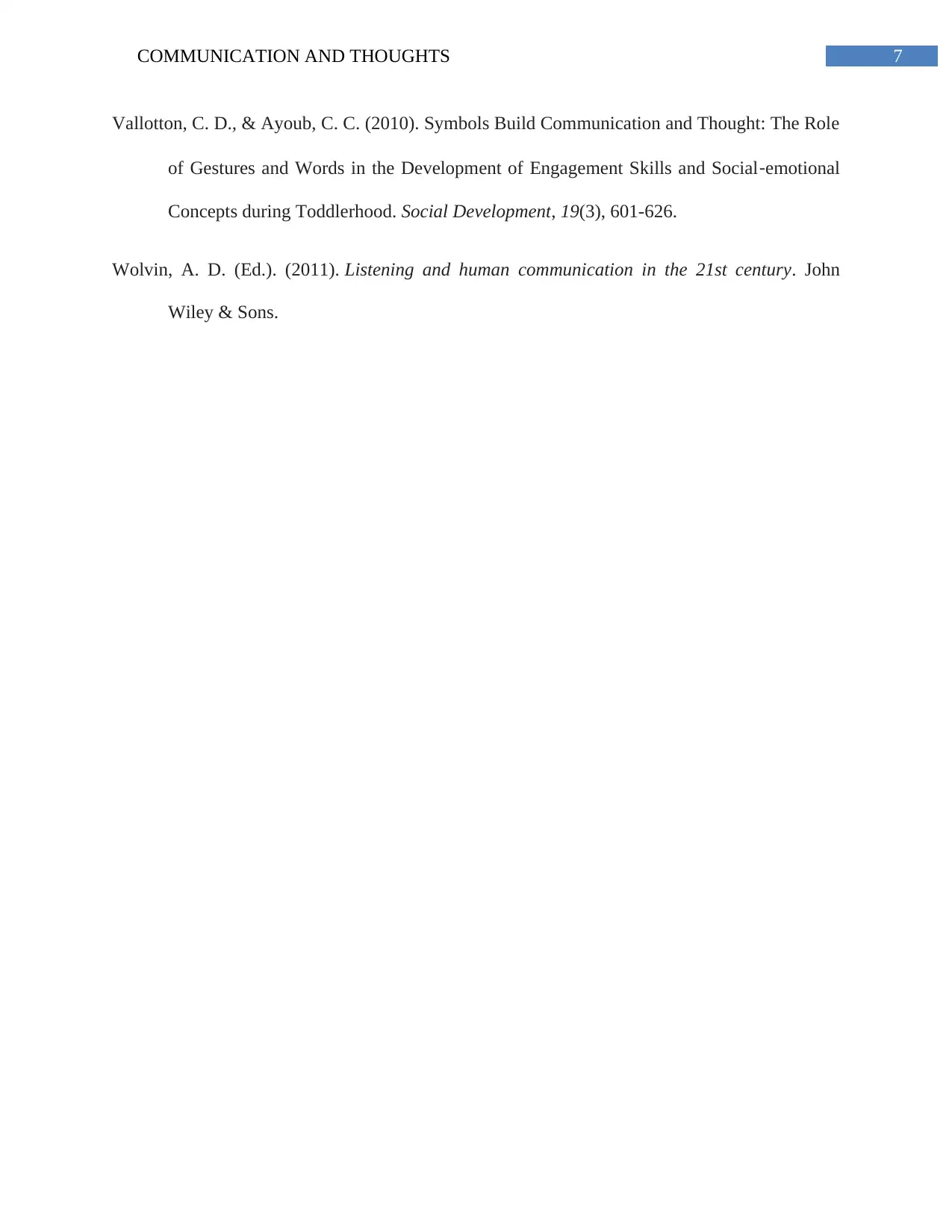
7COMMUNICATION AND THOUGHTS
Vallotton, C. D., & Ayoub, C. C. (2010). Symbols Build Communication and Thought: The Role
of Gestures and Words in the Development of Engagement Skills and Social‐emotional
Concepts during Toddlerhood. Social Development, 19(3), 601-626.
Wolvin, A. D. (Ed.). (2011). Listening and human communication in the 21st century. John
Wiley & Sons.
Vallotton, C. D., & Ayoub, C. C. (2010). Symbols Build Communication and Thought: The Role
of Gestures and Words in the Development of Engagement Skills and Social‐emotional
Concepts during Toddlerhood. Social Development, 19(3), 601-626.
Wolvin, A. D. (Ed.). (2011). Listening and human communication in the 21st century. John
Wiley & Sons.
1 out of 8
Related Documents
Your All-in-One AI-Powered Toolkit for Academic Success.
+13062052269
info@desklib.com
Available 24*7 on WhatsApp / Email
![[object Object]](/_next/static/media/star-bottom.7253800d.svg)
Unlock your academic potential
Copyright © 2020–2026 A2Z Services. All Rights Reserved. Developed and managed by ZUCOL.





